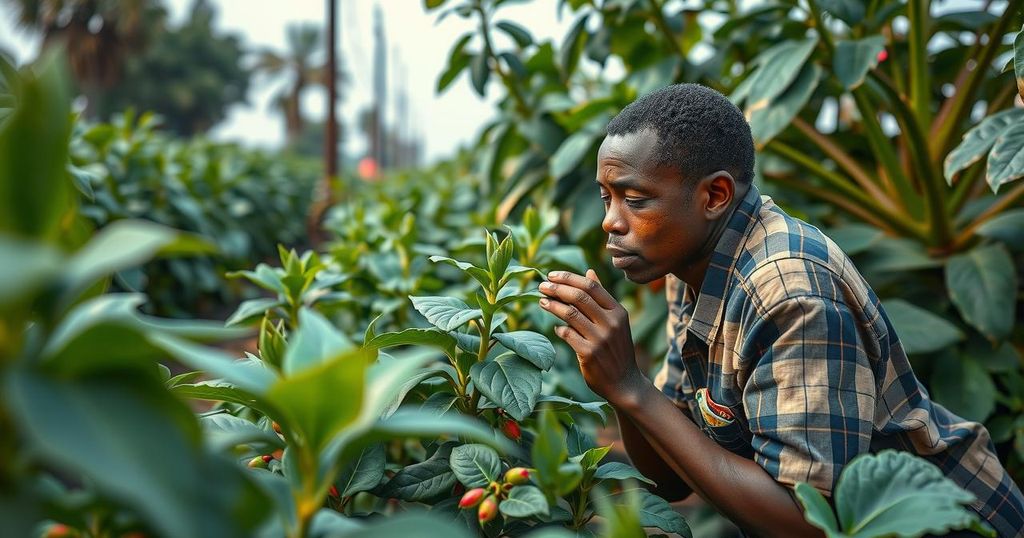Strengthening Plant Health Systems to Mitigate Climate-Induced Crop Losses in South Sudan

A recent study by CABI reveals that enhancing South Sudan’s plant health system is crucial in reducing crop losses caused by climate change-induced invasive pests such as the fall armyworm. The majority of rural households depend on agriculture, yet they face significant challenges, including limited access to plant health services and devastating pest-related losses that threaten food security.
A recent study published in the CABI Agriculture and Bioscience journal by the Centre for Agriculture and Bioscience International (CABI) illustrates the importance of reinforcing the plant health system in South Sudan to mitigate crop losses attributed to invasive pests exacerbated by climate change. The study identifies that climate change has ushered in a variety of new pests affecting agricultural outputs, including the elegant grasshoppers (Zonocerus sp.), bollworms, cassava whiteflies, cutworms, African armyworms, stalk borers, and aphids. Of particular concern is the fall armyworm (FAW), an invasive pest that poses significant threats to staple crops such as maize, sorghum, and others, as noted in a 2017 report by the Food and Agriculture Organization (FAO). South Sudan is classified as a climate change hotspot, where extreme climatic events increasingly disrupt plant health, jeopardizing the livelihoods of approximately 86% of the rural population that relies on agriculture, according to a 2023 report from the United Nations Environmental Programme (UNEP). Despite these pressing challenges, a survey conducted among 960 farmers in various regions, including Juba, Yambio, and Yei, revealed a concerning lack of access to essential plant health services, such as agricultural advice, training, and pertinent information. Farmers in these areas are often reliant on support from NGOs and UN agencies, highlighting a critical gap in government-led initiatives to facilitate plant health services. Further exacerbating the issue, crop pests and diseases have been linked to considerable yield losses. The fall armyworm is reported to adversely impact staple crops like maize, sorghum, and millet throughout various regions in South Sudan. The World Bank’s 2022 report identifies additional notable diseases, such as the cassava mosaic virus and late blight affecting tomatoes. While comprehensive data on yield losses resulting from climate change remain limited, the study emphasizes that approximately 87% of South Sudan’s population experiences moderate to severe food insecurity primarily due to climate-induced phenomena—such as pest infestations, diseases, periods of flooding, and drought. For instance, a CABI report from 2021 noted that the papaya mealybug, a new pest in the nation, was responsible for up to 91% yield losses in papaya, severely impacting the livelihoods of smallholder farmers. Furthermore, cassava brown streak disease and cassava mosaic disease substantially diminish economic viability, collectively causing significant yield losses estimated in the range of hundreds of millions of dollars annually. The study also highlights that the plant health system in South Sudan suffers from weak institutional structures, regulatory limitations, and inadequate availability of quality planting material, predominantly relying on imported seeds. This system has evolved over time, transitioning from traditional farming knowledge to contemporary practices that incorporate integrated pest management and technological advancements. To address the inherent challenges faced by the plant health system, the study advocates for a strategically designed plant health system that emphasizes comprehensive intervention measures. Enhanced farmer advisory services, improved access to plant health information, and targeted agricultural training are crucial for building farmers’ expertise in implementing integrated pest management practices. Ultimately, these improvements would contribute to heightened agricultural productivity and sustainability in South Sudan.
The article elaborates on the findings of a study that investigates the impact of climate change on agricultural pests in South Sudan and emphasizes the necessity of improving the plant health system to safeguard food security. The study serves as a critical analysis of the current agricultural challenges stemming from invasive pests, exacerbated by climate change, that threaten the livelihoods of a substantial portion of the South Sudanese populace.
In summary, the findings of the study underscore the critical need for strengthening the plant health system in South Sudan to combat the adverse effects of climate change-induced invasive pests. By improving access to crop health services and enhancing farmer education on pest management, the nation can work towards securing its agricultural productivity and ensuring the sustainability of food supplies in the face of climatic challenges.
Original Source: farmersreviewafrica.com






